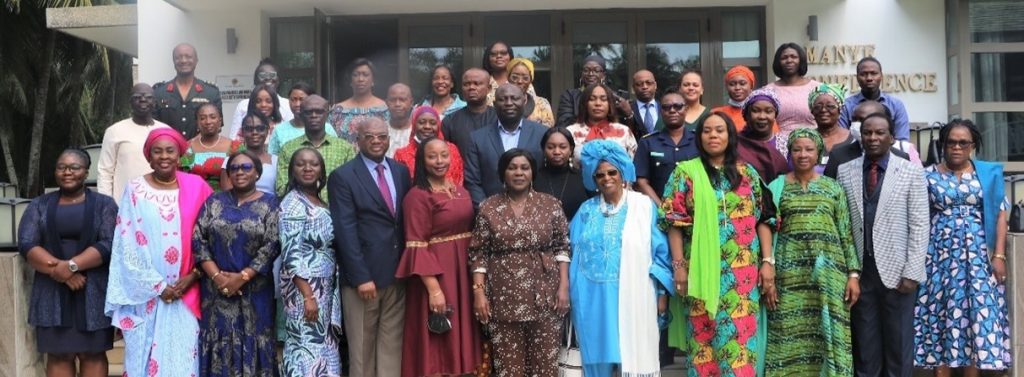ECOWAS and UNDP Organize a Three-Day Regional Training Workshop on the Rollout and Implementation of the African Union Continental
ECOWAS and UNDP Organize a Three-Day Regional Training Workshop on the Rollout and Implementation of the African Union Continental Results Framework on Women, Peace and Security for the ECOWAS Region.
The ECOWAS Gender Development Centre (EGDC), in collaboration with the United Nations Development Programme Regional Service Centre for Africa (UNDP-RSCA) and the AU-Office of the Special Envoy on WPS with the support of the Government of Canada, successfully opened a three days regional training workshop on Women, Peace and Security on 13th June 2022 in Accra, Ghana. The regional training, which brought together over 40 delegates from relevant ECOWAS Institutions, Directorates, Specialized Agencies, Member States and Network of regional CSOs, aims to enhance the knowledge and understanding of participants on the rollout and implementation of the African Union Continental Result Framework (AU-CRF) for Monitoring and Reporting on the implementation of the Women, Peace and Security Agenda in Africa and the United Nations Security Council Resolution (UNSCR) 1325 and subsequent resolutions on Women, Peace and Security (WPS). The training also aims to enhance participants’ capacity on the development, implementation, monitoring and reporting on Action Plans on UNSCR 1325 on WPS.
The regional training is organized within the framework of a four-year regional project on Advancing Gender Equality and Women’s Empowerment in Africa (2020-2024) funded by the Government of Canada. This project aims to strengthen the capacity of Regional Economic Communities (RECs) and other regional partners (CSOs) to have increased evidence-based knowledge and capacity to advocate for and support their member states to meet their commitments to gender equality and women’s empowerment in the context of achieving Agenda 2063.
While opening the training, Hon. Cecilia Abena Dapaah, Minister for Sanitation and Water Resources and Caretaker Minister for Gender, Children and Social Protection, of the Republic of Ghana, in her key note address, reiterated that “ there is need to increase and promote women’s representation and meaningful participation in peace operations, peace processes, post-conflict reconstruction, civilian protection, and military deployments” She added that, “when women participate in peace negotiations, the quality and durability of peace agreements is guaranteed”
Dr. Siga Fatima Jagne, Commissioner for Social Affairs and Gender of the ECOWAS Commission in her opening statement, said that “the regional training is very timely and relevant in building the foundations for a more robust regional and national response to the challenge of placing women, peace and security high on the development agenda of ECOWAS Member States through the effective implementation of NAPs on 1325 and the roll out of the African Union Continental Results framework on Women, Peace and Security”
In her opening statement; Dr. Angela Lusigi, the UNDP Resident Representative, in Ghana, emphasized that “we have moved from the adoption of resolutions to the development of action plans. We now need to focus on achieving speed and scale in the implementation and tracking of these action plans so that no one is left behind”. This she said will not be possible, without the right knowledge, capability and networks; a reason for which the training is both timely and very essential.
Ms. Catherine Njeru, the Gender Monitoring Specialist, who represented the AU-Office of the Special Envoy on Women, Peace and Security, emphasized that “it is critical that all see the CRF as their own commitment and contribution to the advancement of the rights of women to peace as enshrined in Article 10 of the Maputo protocol. This will truly make a difference and pave the way for an inclusive and peaceful Africa”
It is hoped that participants at the end of the workshop will build the required knowledge and skills as key actors in their respective countries to influence the direction and impact of the implementation of Women, Peace and Security (WPS) commitments, including the ECOWAS Regional Action Plan, the CRF as well as support their Member States in developing and implementing their National Action Plans (NAP) on Women, Peace and Security.




